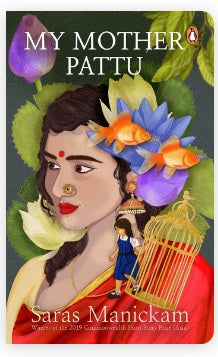Common threads run through the stories in Saras Manickam's My Mother Pattu, a collection of short stories that doesn't look like one from the outside. In the face of adversity and its accomplices: racism, classism, cultural differences, patriarchal attitudes, suffocating traditions and others, the characters struggle to maintain their dignity, ideals, individuality, and humanity.

The window into Saras Manickam's portrait of the human condition is the first story, "Number One, Mambang Lane", in which Meena, a precocious teenage Indian girl, is exiled to her relatives' quiet homestead in the fictional small town of Mambang after committing what her Tamil household considers cardinal sins: falling in love and getting a boyfriend.
As Meena settles in, she is slowly introduced to the community. Towards the end, we do not know of her fate or when her exile will end, which is fine because the thing about stories is that they just keep going – and in directions you least expect.
Heartrending human dramas
As the pages turn, we dip in and out of Mambang as the stories take us on a rocky roller coaster of emotions, much of which hurts, though not as much as the characters do. On the outside, Meena's Uncle Rama and Auntie Sundari are a loving couple and theirs seems a happy home. Underneath all that, however, is a hint of Sundari's discontent with her now humdrum life and Rama's smothering affection, with a bigger dose of homesickness.
We get little respite in the following chapters as the characters are tested and torn. The tragedy of the "Witch Lady" elicits sympathy and ... something else. One Indonesian maid follows her heart and sacrifices security and safety for an uncertain future, while another, roiled by the realisation that the money she sends home has become more important to her family, tries in vain to keep her sister from potentially sharing her fate in indentured servitude.
A daughter has to grapple with her mother's abusive behaviour, which stemmed from the latter's resentment over her lot in life. Three young people's friendship is sorely tested when racism rears its ugly head. Another mother's possessiveness towards her child pushes her too far. And yet another mother's heartfelt, fervent conversation with God regarding her severely disabled son feels oddly autobiographical. All this and more await the reader.
Between a few heart-searing episodes, we get a moment of reprieve. Of note is a story about a Tamil film-loving guy who nearly scuppers a million-in-one arranged marriage made in heaven when he rashly rejects the match. Meena's sardonic humour is also a salve. Much of the book, however, is anger, sorrow, disappointment and tragedy.
So one has to laud the author's determination to tell these stories. Human suffering is hardly picturesque and even the most dedicated of storytellers may not have the stomach to etch it all in such excruciating detail.
Malaysians in the mirror
In a bookstore event, Manickam stated that part of the reason she writes is to give the voiceless a voice, to reveal the thoughts and experiences of people, especially those who would otherwise be invisible, such as the migrants who labour tirelessly for whoever is waiting for them at home. To what end? Perhaps, she said, so we'd learn to treat them better.
As Malaysians, perhaps part of what makes us flinch when reading this is our culpability in causing and perpetuating some of the hurt these characters experience. Remarks laced with microaggressions – from peers, older folks, authority figures, influencers, online commentators, and so on – often go unnoticed, even as the wounds they inflict pile up and wait to erupt.
That the stories are set against a multicultural Malaysian backdrop is no accident. Some of these characters are us, and with this collection, Manickam is holding a tarnished mirror to our faces.
Still, some of the stories also offer a glimmer of hope. Each sad chapter in one's life is but a bump on a long road, where joy and despair take turns at the wheel. There is still much in this country to live for, despite how it hurts, frustrates and disappoints us.
Thus it is understandable, as each story ends, we find ourselves wishing the characters well and hope that better things await them beyond the last page.
This review is based on a complimentary copy of My Mother Pattu from Times Reads. You can also get the book here.





Comments (0)
There are no comments for this article. Be the first one to leave a message!